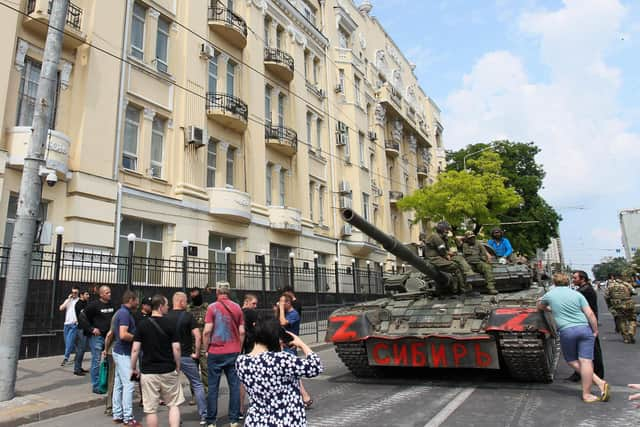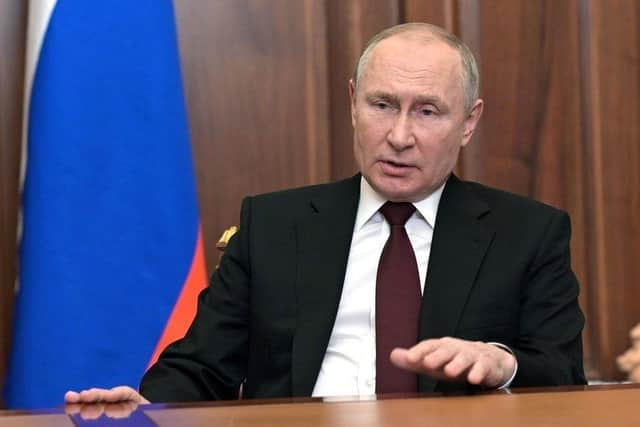Russia Wagner Group: Vladimir Putin faces major leadership challenge as Wagner forces advance on Moscow
Mr Putin denounced the uprising by Wagner Group forces as “a stab in the back” as mercenary chief Yevgeny Prigozhin led his troops out of Ukraine and into the key southern city of Rostov-on-Don.
In a sign of how seriously the Kremlin takes the threat, authorities declared a “counter-terrorist regime” in Moscow and its surroundings, allowing restricted freedoms and enhancing security in the capital.
Advertisement
Hide AdAdvertisement
Hide AdMoscow mayor Sergei Sobyanin warned residents that roads and neighbourhoods would be closed to traffic.


The city faces a "non-working day" today to "minimise risks", as Wagner mercenaries appeared to be moving north from central regions of Russia, in the direction of the capital.
The private army led by Mr Prigozhin seized control of the military headquarters in Rostov-on-Don, a city 660 miles south of Moscow that runs Russian offensive operations in Ukraine, the UK’s Ministry of Defence said.
The governor of the Lipetsk province later said the Wagner Group had entered his region, which is about 225 miles south of Moscow.
As the fast-moving events unfolded in Russia yesterday, Ukrainian president Volodymyr Zelensky said Moscow was suffering “full-scale weakness”, and declared Kyiv was protecting Europe from “the spread of Russian evil and chaos”.


In an address to the Russian nation, Mr Putin called the actions by Mr Prigozhin, whom he did not mention by name, a “betrayal” and “treason”.
The Russian president said: “All those who prepared the rebellion will suffer inevitable punishment. The armed forces and other government agencies have received the necessary orders.”
Mr Prigozhin said his fighters would not surrender, as “we do not want the country to live on in corruption, deceit and bureaucracy”.
Advertisement
Hide AdAdvertisement
Hide Ad“Regarding the betrayal of the motherland, the president was deeply mistaken – we are patriots of our homeland,” the Wagner Group said in an audio message on his Telegram channel.
Mr Prigozhin’s private military contractor has been fighting alongside Russian troops in Ukraine. His goals were not immediately clear, but the rebellion marks an escalation in his struggle with Russian military leaders, whom he has accused of botching the war in Ukraine and hobbling his forces in the field.
“This is not a military coup, but a march of justice,” Mr Prigozhin said.
He confirmed yesterday that he and his troops had reached Rostov-on-Don after crossing the border from Ukraine.
Mr Prigozhin posted a video of himself at the military headquarters in Rostov and claimed his forces had taken control of the airfield and other military facilities in the city. Other videos on social media showed military vehicles, including tanks, on the streets.
The Wagner Group chief said his forces faced no resistance from young conscripts as they crossed into Russia. “But we will destroy anyone who stands in our way,” he said in one of a series of video and audio recordings posted on social media. “We are moving forward and will go until the end.”
The rebellion comes at a time when Russia is “fighting the toughest battle for its future”, Mr Putin said, as Western governments heap sanctions on Moscow and arm Ukraine.
“The entire military, economic and information machine of the West is waged against us,” the Russian leader said.
Advertisement
Hide AdAdvertisement
Hide AdRussia’s security services, including the Federal Security Service (FSB), called for Mr Prigozhin’s arrest after he declared an armed rebellion late on Friday.
It is not immediately clear how Mr Prigozhin was able to enter the southern Russian city or how many troops he had with him.
Mr Prigozhin said he wanted to punish defence minister Sergei Shoigu after he accused Russian government forces of attacking Wagner field camps in Ukraine with rockets, helicopter gunships and artillery. He claimed “a huge number of our comrades got killed”.
He said Wagner’s forces had shot down a Russian military helicopter that fired on a civilian convoy, but there was no independent confirmation of that.
Mr Prigozhin alleged General Valery Gerasimov, chief of the general staff, ordered the attacks following a meeting with Mr Shoigu, where they decided to destroy Wagner. The defence ministry has denied attacking the Wagner camps.
Mr Prigozhin said he had 25,000 troops under his command and urged the army not to offer resistance.
After Mr Putin’s address, in which he did not mention concrete steps to suppress the rebellion, but rather called for unity, officials and state media personalities sought to reiterate their allegiance to the Kremlin and urged Mr Prigozhin to back down.
While the outcome of the confrontation is still unclear, it appears likely to hinder Moscow’s war effort as Kyiv’s forces probed Russian defences in the initial stages of a counter-offensive.
Advertisement
Hide AdAdvertisement
Hide AdThe dispute, especially if Mr Prigozhin were to prevail, also could have repercussions for Mr Putin and his ability to maintain unity.
The Wagner forces have played a crucial role in Ukraine, capturing the eastern city of Bakhmut, an area where the bloodiest and longest battles have taken place.
Mr Prigozhin’s actions could have significant implications for the war. Orysia Lutsevych, the head of the Ukraine Forum at the Chatham House think-tank in London, said infighting between the defence ministry and Wagner would create confusion and potential division among Russian forces.
The Wagner chief, whose feud with the defence ministry dates back years, had refused to comply with a requirement that his forces sign contracts with the ministry before July 1.
The US and the leaders of European countries, including Italy and Poland, have said they are monitoring developments closely, while Estonia, which borders Russia, stepped up border security.
Comments
Want to join the conversation? Please or to comment on this article.